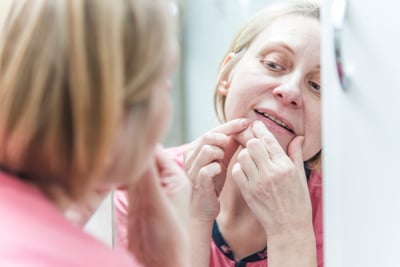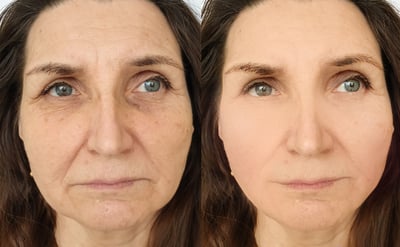
Psoriasis is more than a skin condition. On top of the itching, cracking, and dryness is the emotional toll it takes on the millions who live with it. While research continues to unlock new insights into its biological mechanisms, the mental and emotional impact of psoriasis remains under-addressed, yet deeply felt.
From the sting of social stigma to the quiet exhaustion of disrupted sleep, psoriasis can affect every corner of a person’s life. Anxiety, depression, and feelings of isolation are common companions, often intensified by delayed diagnoses, miscommunication, or a lack of emotional support in clinical settings.
That’s why it’s important to remember that healing goes beyond skin clearance. It means restoring confidence, connection, and quality of life. It means recognizing that emotional wellness is inseparable from physical health, and that every patient deserves to feel seen, heard, and supported.
How does psoriasis impact mental health?
Difficult to cure and likely to relapse, psoriasis doesn’t just affect the skin; it affects self-worth, relationships, and mental health in ways that are often invisible to others. For many patients, the emotional impact can be just as debilitating as the physical symptoms. One study even acknowledged the poor understanding of the condition by the general public and reports that psoriasis can carry the same level of stigma as herpes, leading to detrimental impacts on mental health, including:
Social isolation
Psoriasis lesions are often hard to hide, which can lead to uncomfortable stares, unsolicited advice, and even discrimination. People living with the condition may withdraw from social situations, avoid intimacy, or feel compelled to conceal their skin out of fear of judgment. This feeling of isolation can quickly erode confidence and self-esteem.
Anxiety and depression
Studies show that individuals with psoriasis are significantly more likely to experience anxiety and depression. The unpredictability of flare-ups, the chronic nature of the disease, and the emotional weight of managing a misunderstood condition all contribute to psychological strain. For some, the emotional distress can even trigger or worsen physical symptoms, creating a vicious cycle.
Sleep disruption and overall health
Psoriasis-related itching, pain, and discomfort often interfere with sleep, which amplifies stress, reduces coping ability, and impairs immune function. This makes it harder to manage both the disease and its emotional consequences. In fact, one study reported that the associated pruritus (the medical term for itching and the urge to scratch) led to both a difficulty falling asleep and also waking up from sleep, as well as the need for sleeping pills more often. Researchers found that overall quality of life for psoriasis patients dramatically diminished for people with severe cases.
All these challenges can be exacerbated when patients feel dismissed or misunderstood by their care teams. In contrast with physical symptoms, emotional suffering often goes unspoken during dermatology visits, and that silence can be costly. Yet, recognizing these emotional dimensions is clinically relevant, as effectively addressing them can improve treatment adherence, patient satisfaction, and long-term outcomes.
Managing psoriasis and emotional health: What role do providers play?
Psoriasis care is evolving—and so must the clinical approach. While topical treatments, biologics, and phototherapy remain essential tools, they only address part of the picture. For patients navigating the emotional weight of psoriasis, holistic care means being treated as a whole person, not just a skin condition.
It must start with early referral and collaborative care, both of which can dramatically improve physical and emotional outcomes. Dermatologists who collaborate with mental health professionals, sleep specialists, and primary care providers help patients build a support network that addresses the full spectrum of their needs. Even a simple referral to a support group or therapist can validate a patient’s experience and reduce feelings of isolation.
Yet, patients often hesitate to share emotional struggles with their care team unless prompted. A few open-ended questions, like “How are you coping with flare-ups lately?” or “Has your skin been affecting your sleep or mood?” can unlock critical insights for providers.
When health care professionals are able to incorporate patient-reported outcomes and quality-of-life measures into routine visits, they can better monitor emotional well-being alongside skin clearance. One valuable tool is the Dermatology Life Quality Index (DLQI), which is now the most frequently used outcome measure in dermatology and available in more than 140 languages. Used by clinicians of all types to assist in referrals and decision-making, the assessment can be completed by patients in approximately two minutes and without assistance during a physician visit. It can easily and quickly reveal patterns that guide more personalized care. These metrics also help identify when a patient may benefit from additional support — even if their skin appears “under control.”
The National Psoriasis Foundation also offers the Psoriasis One to One peer support program. The program pairs patients with mentors, who can share how they faced the challenge of their disease, provide information about goal-setting and healthy living, and connect the patient with the nationwide psoriasis community.
How to find psoriasis help that heals
At Forefront, we understand psoriasis is more than skin deep. Emotional wellness is a vital part of every treatment journey, and we’re committed to helping patients feel seen, supported, and empowered, in addition to being treated.
By prioritizing whole-person care and encouraging any referring physicians to collaborate early—especially when patients show signs of emotional distress, sleep disruption, or treatment fatigue—patients can be better connected with additional resources (including behavioral health referrals, support groups, and lifestyle guidance).
Psoriasis may be chronic, but isolation doesn’t have to be. Healing should never be just about reducing plaques or calming inflammation, but should also include restoring dignity, confidence, and connection. You’re not alone: Contact a Forefront physician near you to find the support you deserve.





